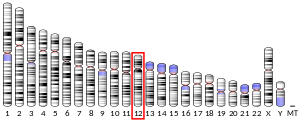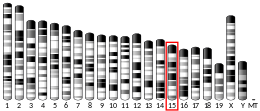DIP2 disco-interacting protein 2 homolog B (Drosophila) is a protein that in humans is encoded by the DIP2B gene.[5] A member of the disco-interacting protein homolog 2 protein family, it contains a binding site for the transcriptional regulator DNA methyltransferase 1 associated protein 1, as well as AMP-binding sites. The presence of these sites suggests that DIP2B may participate in DNA methylation. This gene is located near a folate-sensitive fragile site.[5][6]
| DIP2B | |||||||||||||||||||||||||||||||||||||||||||||||||||
|---|---|---|---|---|---|---|---|---|---|---|---|---|---|---|---|---|---|---|---|---|---|---|---|---|---|---|---|---|---|---|---|---|---|---|---|---|---|---|---|---|---|---|---|---|---|---|---|---|---|---|---|
| Identifiers | |||||||||||||||||||||||||||||||||||||||||||||||||||
| Aliases | DIP2B, disco interacting protein 2 homolog B | ||||||||||||||||||||||||||||||||||||||||||||||||||
| External IDs | OMIM: 611379; MGI: 2145977; HomoloGene: 72227; GeneCards: DIP2B; OMA:DIP2B - orthologs | ||||||||||||||||||||||||||||||||||||||||||||||||||
| |||||||||||||||||||||||||||||||||||||||||||||||||||
| |||||||||||||||||||||||||||||||||||||||||||||||||||
| |||||||||||||||||||||||||||||||||||||||||||||||||||
| |||||||||||||||||||||||||||||||||||||||||||||||||||
| |||||||||||||||||||||||||||||||||||||||||||||||||||
| Wikidata | |||||||||||||||||||||||||||||||||||||||||||||||||||
| |||||||||||||||||||||||||||||||||||||||||||||||||||
References
edit- ^ a b c GRCh38: Ensembl release 89: ENSG00000066084 – Ensembl, May 2017
- ^ a b c GRCm38: Ensembl release 89: ENSMUSG00000023026 – Ensembl, May 2017
- ^ "Human PubMed Reference:". National Center for Biotechnology Information, U.S. National Library of Medicine.
- ^ "Mouse PubMed Reference:". National Center for Biotechnology Information, U.S. National Library of Medicine.
- ^ a b "DIP2 disco-interacting protein 2 homolog B (Drosophila)". Retrieved 2011-12-05.
- ^ Winnepenninckx B, Debacker K, Ramsay J, Smeets D, Smits A, FitzPatrick DR, et al. (February 2007). "CGG-repeat expansion in the DIP2B gene is associated with the fragile site FRA12A on chromosome 12q13.1". American Journal of Human Genetics. 80 (2): 221–231. doi:10.1086/510800. PMC 1785358. PMID 17236128.
Further reading
edit- Houlston RS, Cheadle J, Dobbins SE, Tenesa A, Jones AM, Howarth K, et al. (November 2010). "Meta-analysis of three genome-wide association studies identifies susceptibility loci for colorectal cancer at 1q41, 3q26.2, 12q13.13 and 20q13.33". Nature Genetics. 42 (11): 973–977. doi:10.1038/ng.670. PMC 5098601. PMID 20972440.



